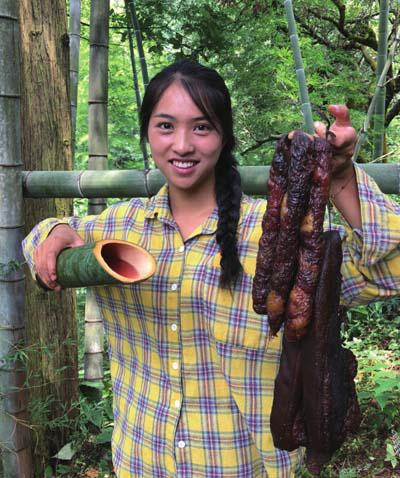Love Me and My Food
2018-09-20ByYuanYuan
By Yuan Yuan

Holding an electric drill, a young pigtailed woman wearing a camouflage tank top drills into a bamboo trunk. A small stream of pink liquid squirts out as she removes the drill. She then lets the sap fl ow into a bamboo container in her hand.
“This is waxberry bamboo liquor brewed inside the tree,” she says, while making an arc with her arm around the bamboo. “All the bamboo trees in this area have liquor brewing in them.”
This is the scene in a recent video clip uploaded to Kuaishou, a short video sharing platform, by Yuan Guihua, a 20-year-old woman in Leizhai Village, Tianzhu County, southwest Chinas Guizhou Province. By sharing videos about her life in the village, she has amassed almost 3 million followers on Kuaishou in two years.
For her, it is simple and fun; anybody in her family with a smartphone can make a video of her. “We dont need to do any editing or worry about shaking or any technical problems while making the video,” Yuan told Beijing Review. “My followers dont mind.”
From fun to business
In 2016, Yuan posted her first video on Kuaishou of her herding cattle in the village. Within a day, the then high school student got over 1,000 followers. This ignited Yuans interest in uploading more videos to the platform, which had more than 120 million daily active users in June.
After graduating from high school, Yuan didnt go to college. In contrast to many other young people in the village seeking to move to big cities, Yuan chose to stay at home to help with the farm work. She is the youngest of three, with an older brother and sister.
In 2017, Yuans number of followers increased dramatically. Most of her videos featured her either eating or cooking on an open wood fire in her familys courtyard. Her meals, exclusively made with home grown and homemade ingredients, always made viewersmouths water. Eventually, some began to offer to buy the preserved meats or sausages, which were a regular part of Yuans recipes.
“Most of the buyers are native to Guizhou but work somewhere else. They miss the comfort food of their hometowns,” Yuan said. “The preserved meats and sausages are the most common foods in my village and everyone here can make them.” The preserved bean curd and chopped red pepper made by Yuans mother also became popular.
Yuan started to sell preserved meats and sausages through WeChat, the largest social networking service in China by number of users, which also has the added function of payment.“At first, my mother didnt believe that I could sell things in this way,” Yuan said. “But when I sold several thousand kilograms before the Chinese Lunar New Year, she was really surprised.”
The period around the Chinese Lunar New Year, which usually falls in January or February, is the peak time for Yuans business, as families are busy making preserved foods in preparation for the traditional festival, which is a time of family reunions.
“I have never been out of Guizhou, but through posting my videos online, I have made many friends from afar,” Yuan said. “I feel very grateful for this.”
“She is so different from other young women we see every day on the Internet,” a follower wrote under one of her videos. “She doesnt put any makeup on. She eats happily out of a big bowl, not like those who dont dare to eat so as to keep a slim fi gure. She is so natural and pretty in her own way.”
Yuans rural life is also new to many. “I never knew that liquor could be brewed in bamboo trunks,” commented another follower. “I think a lot of people like me still know little about village life.”
In addition, Yuans business has benefited other households in the village by helping them sell their own products.
Earlier this year, Yuan set up a cooperative with 33 households struggling with poverty in the village to plant Kadsura coccinea, called Xuetengguo in Chinese. The fruit, which tastes like a lychee, can only grow in a climate similar to that in Yuans village. The first batch of the fruit is expected to hit the market in late October.
Yuan is considering registering a brand for her products but worries that a brand might sound too industrialized and may lead to her losing customers who appreciate her natural elements.
Hometown prospects
Yuans bamboo liquor is normally not for sale. She gives some away as gifts to friends and the rest is strictly for her grandfather, who loves it.
But there are many such bamboo liquor sellers on Kuaishou. Jiang Jinchun, a 40-yearold villager from Hengfeng County in east Chinas Jiangxi Province, is one of them. In his videos, Jiang, normally dressed in ancient costume, holds a bamboo container with liquor in one hand and homemade food in the other, eating either by the riverside or in the nearby forest.
“He eats and drinks so happily,” a follower commented. “The food and drink look really delicious.” This has become a new business channel for Jiang, who returned to his hometown with his wife in 2012 after being in the clothing wholesale business in Yiwu in neighboring Zhejiang Province for years.
“We were too busy to have our daughter live with us while we were in Yiwu and had to leave her in our hometown with her grandparents,” Jiangs wife, Xing Zhao, told Beijing Review.“Sometimes we missed our daughter so much that we spent eight hours riding a motorcycle back home late at night just to visit her.”
Jiang launched an e-commerce store after coming back to Hengfeng and made multiple attempts to expand his business. He started to upload videos to Kuaishou in 2014 and gradually garnered a huge following. With nearly 1 million followers, Jiang has helped more than 200 households in his and surrounding villages export their products, including dried bamboo shoots, bamboo liquor and a local sweet tea. He also teaches other villagers looking to promote their products how to make and upload videos.
Nowadays, Jiang uploads videos almost every day. “Sometimes we make a rough draft of the content, but more often than not we just make it on the spot,” Xing said.
More stars
Compared to Yuan and Jiang, Gan Youqins team is more professional. A farmer from Suwutang Village in Lingshan County, south Chinas Guangxi Zhuang Autonomous Region, Gan used to work in neighboring Guangdong Province as a low-paid migrant worker until she decided to move back home in 2014.
Her nephew, Zhang Yangcheng, a college graduate who majored in broadcasting and communication, saw potential in Gan, a good cook who always brought fresh ideas to recipes, and encouraged her to make cooking videos to share online.
The fi rst video clip was uploaded to Toutiao, a popular news aggregator, on May 19, 2017. Gan was so nervous in front of the camera that she couldnt say a word but only laughed. Later, her laughter would become her signature feature. Zhang made detailed plans for the content of every video they uploaded. They started fi lming at 10 a.m., fi nished in late afternoon and Zhang edited the footage at night.
Xigua, a short video sharing platform affi liated to Toutiao, later offered Gan a contract, giving a big boost to her fame and business. Within a year, Gans followers surpassed 1 million. She has become a media phenomenon and was invited to participate in a cooking program on state broadcaster China Central Television on June 4.
Now, Gan uploads two clips a day, with each getting more than 300,000 views. The sales volume of her agricultural products—mostly local fruit—easily exceeds 1 million yuan ($146,760) each month, a miracle for a vendor in a remote village which is not even close to a railway station. Her husband is in charge of delivery and her three cousins work on customer service.
The success of short video sharing platforms in promoting agricultural products has led to offi cials taking action as well. On August 17, Chen Tingjun, Mayor of Gulin County in southwest Chinas Sichuan Province, uploaded a video to Douyin, a subsidiary of Toutiao with more than 150 million daily active users in June, promoting the countys plums. Within 10 days, plum sales surpassed 150 tons.
Li Youjun, Mayor of Changshun County in Guizhou, has also helped to sell more than 80,000 green-shelled eggs, a local delicacy, via Douyin and another live-streaming platform.
Recently, both Xigua and Kuaishou launched specific columns for rural residents to promote their products. “It is a good way to create a direct link between village residents and their followers,” said Zhang Fan, a manager with Kuaishou. “We have witnessed many encouraging stories and believe the future of this business mode is promising.”
